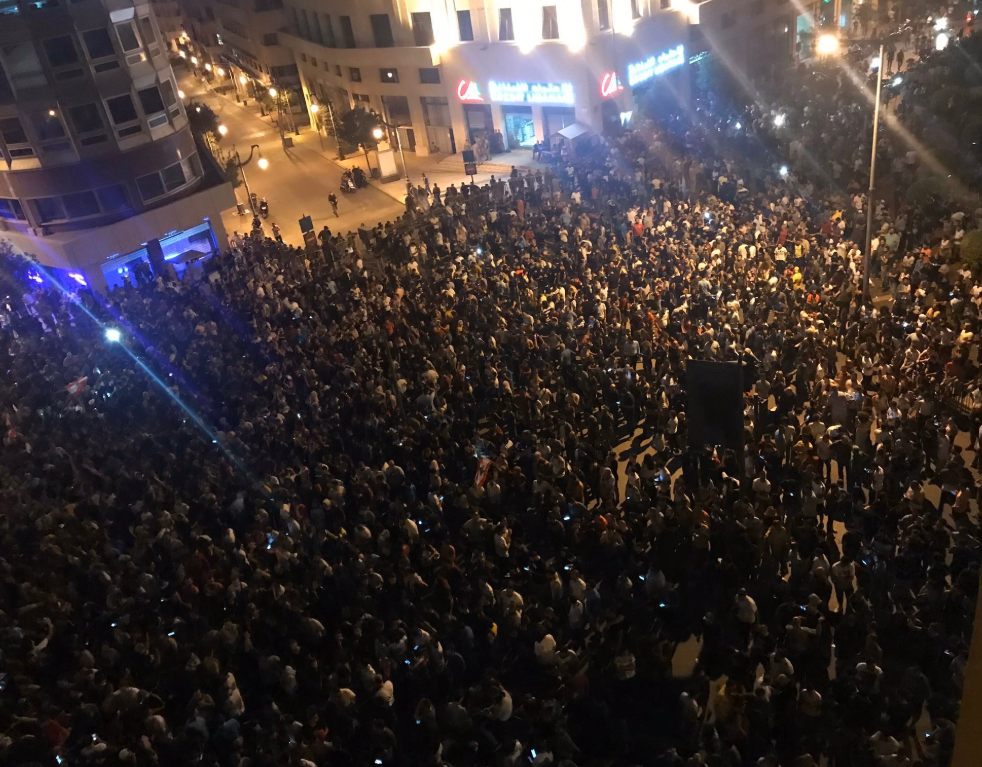About two million of people swarmed the streets of Lebanon over the weekend to protest governmental corruption. This is a record number of people who have taken to the streets since the so – called «cedar revolution» – a mass movement for the revival of democracy in Lebanon in 2005 after the assassination of Prime Minister Rafik Hariri. The General Confederation of workers (CGT) of Lebanon supported the mass protests of the population.
Anti-government demonstrations in Lebanon started on October 17, the day before the Council of Ministers meeting. The protests erupted after new taxes were announced including a $6 per month levy on the messaging application WhatsApp. People were outraged by the new taxes in the growing economic crisis. People demanded regime change and the resignation of the government.
«People cannot take it any more. There are no good schools, no electricity and no water», – said Nader Fares, a protester in central Beirut.
Lebanese protesters of all ages flooded major cities and towns nationwide. They demanded an end to corruption and the rule of the country’s political elite. Protesters danced and sang in the streets, some waving Lebanese flags and chanting.
Protests in Lebanon have begun to turn into raves as a DJ plays music from the balcony to protestors below https://t.co/19KiHYuP0I pic.twitter.com/XfbinsqP8o
— Arab News (@arabnews) October 19, 2019
Since Saturday the protests have been mostly peaceful, but some demonstrators went on a rampage Friday night, smashing shop windows and bank exteriors in Beirut’s glitzy downtown. 21 October protesters blocked the main road leading to Beirut from the North of the country. People chanted «revolution» and «the people demand the fall of the regime». They called for revolution in protests that resembled the 2011 Arab revolts that toppled four presidents.
Incredible! A literal ocean of demonstrators in #Beirut as 1.5 million people (1/4 of #Lebanon’s entire population) hit the streets today to protest corruption and economic inequality.
The Lebanese are fed up with this atrocious system. #LebanonProtests pic.twitter.com/63qGpKsJxE
— Sarah Abdallah (@sahouraxo) October 20, 2019
Protests erupt in Beirut after Lebanon's government announces a tax on WhatsApp and other internet calls https://t.co/TvajbDYiA9 pic.twitter.com/ut4FhTek3j
— Al Jazeera English (@AJEnglish) October 17, 2019
Lebanese Prime Minister Saad al-Hariri agreed on Sunday a package of reforms with government partners to ease an economic crisis that has sparked protests aimed at ousting a ruling elite seen as riddled with corruption and cronyism. The leader of the Christian party «Lebanese forces» (LS) Samir Jaajaa called the reason for the acute crisis that gripped the country, the lack of trust between the people and the ruling political class. After three days of popular unrest, four Ministers, including Deputy Prime Minister Hasan Hasbani, resigned from their posts.
People across Lebanon have been protesting for 5 days against corruption and the economic crisis. Hundreds of thousands marched in Beirut, its biggest protests in 10+ years: pic.twitter.com/uNjShO0EVo
— AJ+ (@ajplus) October 21, 2019
According to the World Bank, the breakdown of Lebanese public resources has contributed to pushing approximately 200,000 additional Lebanese people into poverty and slowing the national GDP. Citizens in the country often suffer electricity and water shortages.


